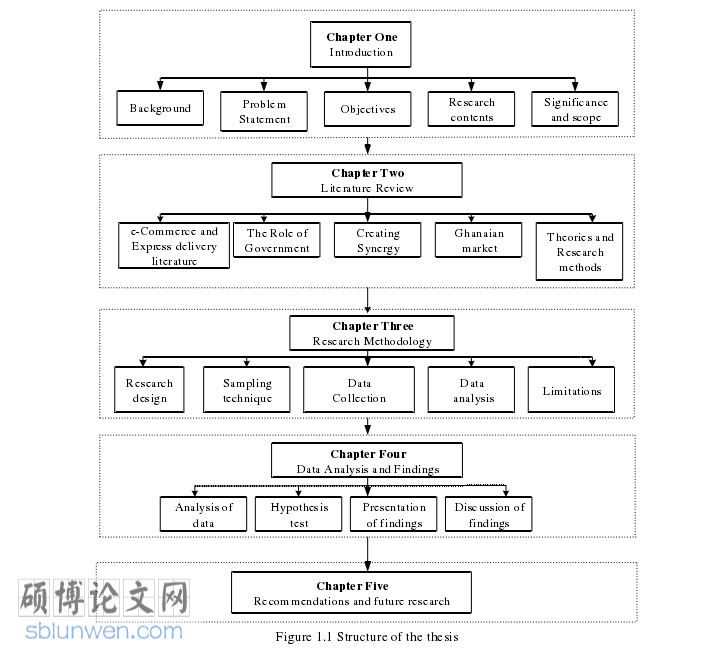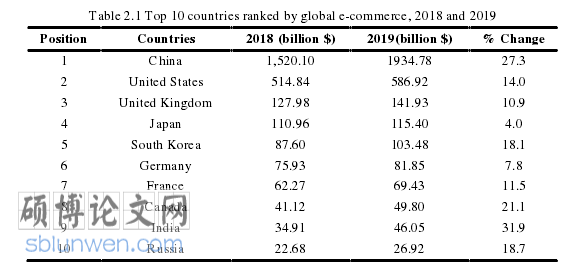1.1 Background to the Study
E-commerce has proven to be the new paradigm shift in retail and international trade. It is defined as the transaction of business online [1]. New companies use online shops to sell and advertise their products and services. This is undoubtedly famous across the global economy, as more and more people are buying and selling from the comfort of their homes. Many physical shops are gradually opening online shops and show rooms to complement the physical shops which have huge capital expenses on space renting and wages for large number of employees. According to the US Census Bureau [2,3] e-commerce has contributed about one-tenth of the overall retailing and half of several other major categories in the last decade. China's online shopping market totaled US$953 billion in 2017. It increased by 29.6 percent from 2016 and picked-up in growth [4].
In Ghana, business entities such as retail shops, supermarkets, advertisement firms, restaurants, boutiques, sellers of computers and accessories among others have started creating online markets to sell their products. These shops come in specialized models such as consumer-to-consumer (C2C), business-to-consumer (B2C), and business-to-business (B2B). C2C model is where the online market allows retailers, who are not the brand owners or manufacturers of a product, to sell the product to other individuals (e.g. Taobao.com and e-bay). The B2C is the type of e-commerce where the brand owner or the product manufacturer directly sells to the consumer or purchaser. B2B is the instance where the brand owner sells the product directly to another business other than an individual consumer.
The efficiency and profitability of these online shops largely depend on swift distribution. The express delivery companies therefore play a major role in getting the products to the purchasers. Express delivery is a parcel delivery service which delivers the product to the door step of the purchaser at faster rate other than the traditional postal order-delivery time. It is fast developing and also currently one of the strong contributors to economic growth in the developed countries. Express delivery has therefore proven to have a symbiotic relationship with e-commerce as the two entities rely on each other. According to [5], China’s express delivery firms dispatched about 40 billion parcels in 2017, with the global parcel market reaching almost US$350billion in 2017.
.........................
1.2 Problem Statement and Objectives
1.2.1 Objectives The objectives of this study are as follows:
(1) To analyze the challenges facing e-commerce and express delivery services in Ghana;
(2) To analyze ways of making e-commerce more vibrant in Ghana;
(3) To make recommendations on how e-commerce and express delivery can be synergized and leveraged towards economic growth in Ghana.
1.2.2 Research Content
The following are the main issues this research aims to address and some brief explanations of them:
(1) Examining the challenges facing e-commerce in Ghana
The study analyzes the current state of e-commerce in Ghana, how effective the payment ecosystems have been, and the challenges to the growth of the industry. It also examines the security of transactions and how it could be strengthened with regulatory mechanisms. Finally, the research examines the interoperability among internet service providers, banking, and e-commerce service providers.
(2) Examining the challenges facing express delivery in Ghana
Express delivery in Ghana, is having a slow growth rate due to its technological deficit. The research analyzes the current state of express delivery so as to make recommendations to the PCSRC and the 130 licensed operators on the measures to revamp the industry.

MBA论文参考
2 LITERATURE REVIEW
2.1 Introduction to the Review
This literature review comprises seven (7) sections. It reviews over 100 recently published peer-reviewed papers related to the problem under study, specifically, e-commerce payment systems and security, parcel delivery and regulations, the role of government to the online market and postal service, third-party logistics, theoretical developments, and an overview of the current e-commerce and express delivery trends in Ghana.

MBA论文怎么写
.............................
2.2 Overview of e-Commerce
2.2.1 Online Market
The continuous advancement in ICT has led to many innovations in commerce. Companies have equally been adopting these technologies to survive in the market [13]. To survive in the modern business environment, companies must adopt new technologies. As a result, there have been interventions by many governments across the globe to improve internet infrastructure and policies to make it easy for businesses to adopt innovations [14]. The mode of doing business has been influenced by the internet [15]. There have been conscious efforts of retailers to adopt strategies that can increase their customer base and one of such is online sales [16]. It has gone beyond the retail market and also influenced agribusiness. E-commerce reduces costs, cycle time of products and enables easy access to suppliers [17]. These online sales come in diverse forms depending on the entity selling and the entity purchasing. Popular among them are B2B, C2C, and B2C [18]. Existing market data and trends shown in Figures 2.1, 2.2, and Table 2.1 below, support the earlier references on the importance of e-commerce in the modern economy. The figures are retail e-commerce statistics compiled by [19].
From Table 2.1 and Figure 2.1, China was the highest retail e-commerce earner in 2018 and 2019, with a whopping 27.3% annual growth rate. This shows an outstanding patronage of online retailing and an evidence of businesses making good use of the internet. Among these 10 countries, India was the fastest-growing with 31.9% growth in 2019.
From Figure 2.2, it can be identified that although some countries were not among the top ten retail e-commerce earners, they were making high growth in their online retailing: Mexico, Philippines, Malaysia, Indonesia and Argentina. It is significant to note that Mexico had the highest growth rate in 2019, followed by India and Philippines, higher than China, which had the highest revenue in the globe.
..............................
3 RESEARCH METHODOLOGY ............................................ 23
3.1 Introduction to the Methodology ................................. 23
3.2 Research Design .................................. 23
3.3 Sampling Technique ..................................... 23
4 DATA ANALYSIS, FINDINGS, AND DISCUSSIONS ............................. 28
4.1 Introduction ................................. 28
4.2 Characteristics of Survey Respondents ..................................... 28
4.3 Hypotheses Test ............................................ 29
5 RECOMMENDATIONS AND FUTURE RESEARCH ........................... 45
5.1 Introduction ................................... 45
5.2 Recommendations ......................................... 45
5.3 Future Research ........................................ 46
5 RECOMMENDATIONS AND FUTURE RESEARCH
5.2 Recommendations
Based on the analyses and discussions of the findings identified in this study, the following recommendations are proposed by the author for implementation by both managers and the government of Ghana towards a more collaborative development of the express and e-retail industry.
(1) It is imperative that the issue of trust is solved with policies and technology. The addition of third-party guarantee to online transactions is necessary because the purchaser will by that, be sure that there is a significant probability of retrieving their money should there be a disappointment. Also, the author asserts that, the addition of new transaction authentication technologies aside the known password and pin code systems also stand a high chance of increasing trust. An example of such emerging technologies is the Financial Transaction Application invented by [142].
(2) Policy makers should enact e-transaction-friendly policies and incentives that will ultimately give users of digitized services advantage over ordinary cash-based and face-face transactions as proposed in [135]. The implementation of QR code as a medium of payment and the adoption of a special promotional day like the Singles’ Day are therefore recommended.
(3) There is the need for more IT training and education in Ghana to form a motivational ecosystem for electronic commerce and indicated by [115]. This is because there is enough evidence from the findings that the youth have a promising preference for e-marketing and e-retailing and as such form a good demand for the market.
(4) The evidence based on the findings show that the express service supply is in deficit. The issue of trust is however identified as an impediment to partnerships and mergers. The author therefore recommends public-private partnerships (PPPs) for the postal services as well as tax and logistics incentives for companies that take the bold step to synergize their expertise, resources and synergies. The extant literature provides the basis and essence of this as averred in [137-139].
..............................
5.3 Future Research
Future research must focus on case studies to find out measures of creating consumer-trust in e-commerce in Ghana. The results of the case studies should be followed by pilot surveys. These pilot surveys will help to find a dependable solution for the e-commerce industry in Ghana. It will also be important to research more into the government’s untapped tax net in e-commerce in Ghana. These are summarized below as follows:
(1) Exploratory case studies into solving the prevalence of low consumer-trust in e-commerce in Ghana;
(2) Surveys to uncover the reasons for low patronage of digitized payments and services in order to find sustainable remedies;
(3) Investigations into how the government of Ghana can tap its latent e-commerce tax net in in Ghana; (4) A pilot test of express-to-online shop synergy to know its viability and applicability in Ghana.
The proposed methodologies for the future research areas are empirical case studies from developed e-commerce economies such as China and the US. There can be a case study of taobao.com (c2c platform) and Alibaba.com (b2b platform). The scope of the case studies can be the business strategies used by these companies to gain consumer-trust and how they do their promotional sales. Another case study could be how the Chinese government leverages these companies for revenues and taxes.
..........................
CONCLUSION
This study contributes to the electronic commerce and express delivery literature both theoretically and practically. It seeks to find solutions to the challenges facing both sectors of Ghana’s economy, analyze empirical-based and theoretical-based evidence on making electronic transactions popular in Ghana and find practical ways to create a synergy of companies in the field as well as widen government tax base in the sector.
With the problem strongly grounded in literature, the various theories related to e-commerce have been reviewed together with current market trends. The application of survey methods (questionnaires and interview) also enabled the author to identify the feelings and realities of the actual situation, among the respondents. This has enriched the findings and recommendations proposed. The survey was characterized by some difficulties, as the author was refused entry to some of the institutions earmarked for interviews. There were also issues regarding the number of samples and the use of online survey. This became imperative since the nature of the study necessitated purposive sampling, albeit the low number of e-service patronage in Ghana.
The findings from the study, such as: perceived low consumer-trust in online transactions; insufficient express service supply for e-commerce; low acceptance of digitized services; inadequate consumer-incentives for government services; the slow rate of express deliveries; and the seemingly promising e-commerce market based on high patronage among the youth (18-40 years), presents a reference point for policy makers and business managers.
reference(omitted)
